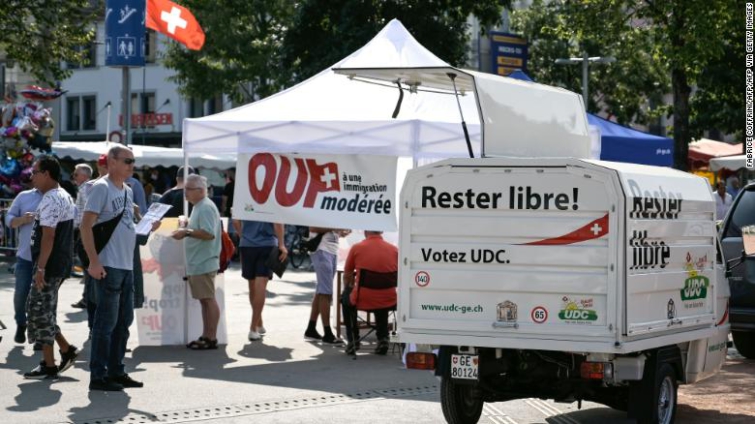Swiss voters overwhelmingly rejected on Sunday a right-wing party's attempt to scrap a pact allowing the free movement of people from the European Union, opting for stability amid the economic uncertainty caused by the coronavirus pandemic.
The Swiss People's Party (SVP) had forced a binding referendum on the EU agreement in a bid to curb immigration to the country where foreigners make up a quarter of the population.
The measure lost by 62%-38% margin. The SVP - the biggest party in parliament - has long pushed to take back control of immigration, echoing some arguments pro-Brexit politicians used in the run-up to Britain's exit from the EU.
It won a referendum on the issue in 2014, only to see parliament water down its implementation.
Opponents said the plan would have robbed business of skilled workers and torpedoed accords that enhance non-EU member Switzerland's access to the crucial EU single market.
Under Switzerland's system of direct democracy, the referendum could have forced the government to annul the EU agreement if negotiations did not produce a deal on ending the pact voluntarily, something Brussels has ruled out.
A "guillotine clause" meant that ending free movement would have toppled other bilateral pacts on land and air transport, procurement, technical barriers to trade, and research.
Around two-thirds of the 2.1 million foreigners living in Switzerland in 2019 were citizens of the EU, as well as Iceland, Norway and Liechtenstein, which with Switzerland are members of the European Free Trade Association (EFTA).
More than 450,000 Swiss live in the EU.
The domestic political battle immediately turned to Switzerland's biggest foreign policy headache: a stalled treaty meant to cement ties with the EU but which critics say infringes too much on Swiss sovereignty and would never win a referendum.
The treaty would have Bern routinely adopt single market rules and create a new platform to resolve disputes.
With questions open over state aid, rules to protect high Swiss wages, and access to welfare benefits, the Swiss have dragged their feet while trying to forge a domestic consensus, triggering a row over cross-border stock trading.
Amid relatively high turnout, voters narrowly blocked an attempt to make it easier to shoot wolves deemed a threat to livestock.
In an unexpectedly close vote, they approved the government's plans to buy new fighter jets for up to 6 billion Swiss francs ($6.46 billion).
Latest Stories
-
DAMC, Free Food Company, to distribute 10,000 packs of food to street kids
58 minutes -
Kwame Boafo Akuffo: Court ruling on re-collation flawed
1 hour -
Samuel Yaw Adusei: The strategist behind NDC’s electoral security in Ashanti region
1 hour -
I’m confident posterity will judge my performance well – Akufo-Addo
2 hours -
Syria’s minorities seek security as country charts new future
2 hours -
Prof. Nana Aba Appiah Amfo re-appointed as Vice-Chancellor of the University of Ghana
2 hours -
German police probe market attack security and warnings
2 hours -
Grief and anger in Magdeburg after Christmas market attack
2 hours -
Baltasar Coin becomes first Ghanaian meme coin to hit DEX Screener at $100K market cap
3 hours -
EC blames re-collation of disputed results on widespread lawlessness by party supporters
3 hours -
Top 20 Ghanaian songs released in 2024
4 hours -
Beating Messi’s Inter Miami to MLS Cup feels amazing – Joseph Paintsil
4 hours -
NDC administration will reverse all ‘last-minute’ gov’t employee promotions – Asiedu Nketiah
4 hours -
Kudus sights ‘authority and kingship’ for elephant stool celebration
4 hours -
We’ll embrace cutting-edge technologies to address emerging healthcare needs – Prof. Antwi-Kusi
5 hours

